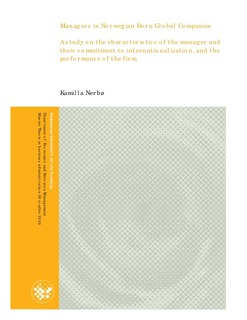Managers in Norwegian Born Global companies : a study on the characteristics of the manager and their commitment to internationalization, and the performance of the firm
Abstract
The purpose of this study was to test a model developed by Freeman and Cavusgil (2007), which describes different characteristics among managers in the Born Global company, and the relationship between these characteristics and the commitment to accelerated internationalization in these firms. The aim has been to contribute to the development of theory on the relatively new phenomenon “Born Globals”, and more specifically on the characteristics of the manager in this type of firms and the effect he or she has on the behavior of the firm.
The research questions that were answered were whether the characteristics that define the four commitment states, “the responder”, “the opportunist”, “the experimentalist” and “the strategist” in the typology developed by Freeman and Cavusgil (2007), could be identified among the Norwegian Born Global companies and their managers, and whether they are related to each other and to the commitment to internationalization. Further, the research questions of whether there is a relationship between these characteristics and the international experience of the managers, and between the characteristics and the performance of the firm were answered.
The design of the research was descriptive and quantitative, and a survey using Questback was distributed to a sample of companies characterized by having high-tech products or processes, fewer than 100 employees and having been established after 1990. A requirement of international activities being initiated no later than six years after inception was also applied. These requirements are often used to define the Born Global concept. An essential part of answering the research question was the operationalization of the model by Freeman and Cavusgil (2007) by the researcher. The survey and the results obtained were based on this operationalization. When analyzing the data, SPSS was used for the statistical procedures that were conducted to test the relationships between the different variables.
This study found that five characteristics could be identified among the managers in the Norwegian high-tech Born Global companies. These five factors were Adaptiveness, Innovative orientation, Risk-taking behavior, Other-oriented behavior, and Personal interactions. These characteristics did not show strong indication of being related to each other. Further, tests on the relationships between these characteristics and commitment to internationalization found that Personal interactions were related to higher percentage of international sales within three years, and to the number of continents the companies were present in. Innovative orientation was found to increase likeliness of internationalize within three years after inception. Based on these results, the characteristics of the manager and the relationships between them, as well as the relationship between the characteristics and commitment, were not identified among the Norwegian Born Globals in the same manner as the model in the typology by Freeman and Cavusgil (2007) indicated.
With regards to the relationships between the characteristics and the degree of international experience among the managers, experience gained at home, such as traveling through work or other contact with international market before becoming a part of the Born Global company, had a higher degree of Other-oriented behavior and Personal interactions. International experience obtained abroad, such as working or studying abroad, also had a positive effect on Personal interactions. The characteristics of Adaptiveness, Personal interactions and Other-oriented behavior were found to have a positive relationship with performance. Even when controlling for size in revenues, size in terms of number of employees and age of the company, these characteristics have a significant effect.
